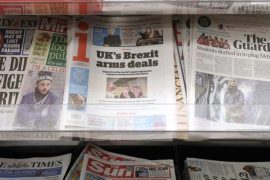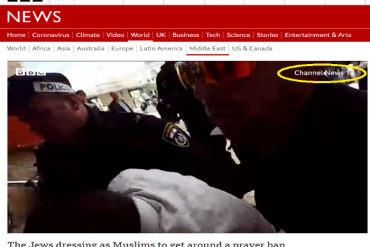An article in the London-based i newspaper by journalist Sarina Sandhu (“Sally Rooney: BDS movement explained after author refuses Israeli publisher for Hebrew translation of new book”, Oct. 12) did what British media outlets often do: obfuscating the true goals of BDS, whilst omitting the opinions of Jews on the campaign to boycott the Jewish state – and only the Jewish state.
After briefly explaining the decision by Irish-based Marxist author Sally Rooney to refuse to sell the publishing rights to her latest book to any Israeli publishing house “because of the plight of Palestinian people”, the reporter provides background on the BDS movement:
It seeks justice for those involved in the ongoing Israeli-Palestinian conflict.
By imposing economic, cultural and academic boycotts on Israel, it aims to pressure the country over its treatment of Palestinians and urges the Israeli government to recognise their rights, and end what many Palestinians see as an apartheid system
BDS doesn’t narrowly seek “justice” for Palestinians. It’s an illiberal movement that fiercely opposes co-existence projects between Palestinians and Israeli, and denies justice to Jews by opposing the continued existence of the Jewish state. The main BDS site states its opposition to Israel’s “Law of Return”, which allows Jews to freely immigrate to the country and ensure that Jewish refugees can find a safe haven in their ancestral homeland, whilst promoting the right for millions of descendants of Palestinian refugees to move to Israel and turn Jews into a minority.
Moreover, the movement’s co-founder, Omar Barghouti, is quite clear on the matter of whether Israel has the right to exist in some form:
The article continues in its dishonest framing in a sections asking ‘Who supports BDS’? and ‘Who sees BDS as antisemitic.
Sandhu writes that “Rooney is not alone in supporting the BDS movement, which has grown in popularity around the world“, yet fails to provide evidence pointing to its alleged increasingly international popularity. She then reports that “Rooney was one of hundreds of writers and artists who signed a Letter Against Apartheid” but fails to explain how the letter, whose signatories were largely marginal figures in the artistic community, was significant or in any way influential.
After noting that South African bishop and veteran anti-apartheid campaigner Desmond Tutu backs the BDS campaign, Sandhu informs readers that those opposing it consist of Benjamin Netanyahu and Donald Trump:
Benjamin Netanyahu, leader of the opposition in Israel and the country’s former prime minister, previously said it was an international attempt to “blacken” the nation’s name.
…
The Trump administration was also against the movement, with former Secretary of State Mike Pompeo once calling it a “cancer”.
This is a classic example of ‘stacking the deck’, highlighting, as opponents of BDS, only those figures the journalist knows her readers overwhelmingly dislike, whilst citing, as a prominent BDS supporter, a public figure readers hold in high esteem. Sandhu could have mentioned that Netanyahu’s position on BDS is shared across the Israeli political spectrum. Even Nitzan Horowitz, head of the far-left Meretz Party, opposes boycotts.
In the US, Barack Obama, Joe Biden and the overwhelming majority of the Congress oppose BDS. Even Jimmy Carter opposes it, as does the European Union, Boris Johnson and the British Labour Party under Keir Starmer.
Sandhu also fails to explore the views of Jews on BDS – those who are either directly impacted by a boycott of the Jewish state, or, with diaspora Jews, have an organic, historically-informed hostility the movement – a community which has born the brunt of antisemitic attacks often inspired by the anti-Israel vitriol of those supporting the boycott movement.
A major EU poll of European Jews (including Britons) conducted in 2018 showed “82% of Jews classed calls by non-Jews to boycott Israel or Israelis as anti-Semitic”, and a poll of British Jews by Campaign Against Antisemitism in 2020 found that “83% felt intimidated by tactics used to boycott Israel”.
In the US, a poll in 2020 by Pew Research Center found that “the vast majority [of American Jews] who have heard of the [BDS] movement say they oppose it”, with only 10% supporting it, whilst an American Jewish Committee poll that same year found that 80% of US Jews believe BDS is compromised by some degree by antisemitism.
Once again, we see how media outlets publishing putatively straight news articles on BDS, through omission and misrepresentation, skew the story in a manner that leads readers to the desired pro-boycott position.






When some of these useful idiots are ranting, lies and propaganda one can take it that there has been serious upbringing brainwashing, or they are venting to get the vote, but eventually they will go the way of their idols into the dustbin of history.